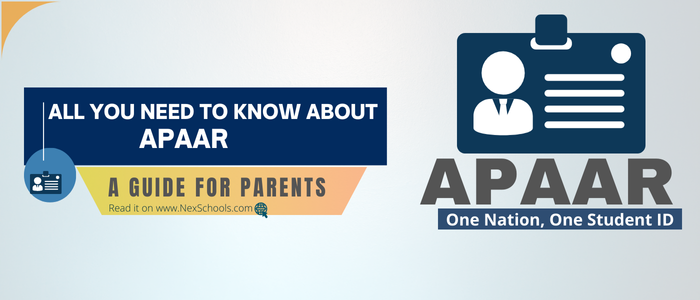
What is APAAR?
APAAR is a unique identification system for students in India, aimed at creating a single, lifelong academic ID. It serves as a centralized digital record of a student’s achievements from school to higher education.
This initiative supports the National Education Policy (NEP) 2020 and is aligned with the government’s Digital India mission to make education more accessible, efficient, and secure. Here’s a comprehensive guide to help parents from both regular schools and homeschooling families understand what APAAR is and how it benefits students.
APAAR, which stands for Automated Permanent Academic Account Registry, is a specialized identification system designed for all students in India. This initiative is part of the "One Nation, One Student ID" program launched by the government.
It allows students to store their academic records in one central online place throughout their entire education. This system works with DigiLocker, a government-supported platform, so students can safely access and share their academic documents like exam results and certificates whenever they need to.
The main goal of APAAR is to make managing academic data easier and to help students move smoothly between different schools, colleges, or states without losing any of their academic records.
Why APAAR Matters in Nutshell
APAAR IDs are a step forward in creating a modern, digital education system in India.
-
Make academic life easier for students and parents by simplifying records and processes.
-
Enable students to explore flexible and personalized learning pathways.
-
Support the Digital India and NEP 2020 vision of accessible, future-ready education.
Read More
Minimum Age Limits for Social Media Use Worldwide
CTRL Movie Review - Why Parents Should Be Worried
At-Home Namny Services- Is It Worth It?
How Schools Get Involved With Cyber Safety Awareness Week
Symbiosis Skills & Professional University Hosts Event on Digital Ethics and Safer Internet
SCERT Delhi Organizes Training for ICT Teachers to Prepare for an AI-Driven Future
Is APAAR Mandatory for Students?
APAAR is not mandatory for students. While it offers numerous benefits, students are free to choose whether or not to register for an APAAR ID. However, the advantages of having an APAAR ID, such as seamless academic tracking and enhanced mobility, make it a valuable tool for students.
Key Benefits of APAAR for Students and Parents
-
Easy Academic Tracking:
APAAR lets students keep track of their academic progress from school to higher education in one place.
-
Better Mobility Between Institutions:
Students can move between different schools, colleges, or universities across India without losing any of their academic credits or records.
-
Simple Credit Transfers:
Credits earned at one institution can easily be recognized by others, making it easier for students to switch schools or courses without starting from scratch.
-
Personalized Learning Paths:
Students can choose their own learning paths and accumulate credits at their own pace, making education more flexible and tailored to their interests
With the ability to track credits and achievements, students can explore personalized learning options and switch between courses or institutions.
How is the APAAR ID Issued?
APAAR IDs are issued by educational institutions after obtaining mandatory parental consent, as many students are minors.
Issuing the APAAR ID involves the following steps:
-
Parental Consent Is Mandatory:
Since many students are minors, schools must first obtain approval from parents before creating the ID.
-
Documents Needed:
Parents may need to provide their Aadhaar IDs, driving license numbers, or other identity documents during registration.
-
Digital Registration:
Once approved, schools register students for the APAAR ID, linking it to their academic records.
-
School Responsibility:
Schools will organize meetings or sessions to explain the process and collect the necessary details from parents.
Once these steps are complete, the unique APAAR ID will be assigned to the student
How Does APAAR Align with NEP 2020?
The National Education Policy focuses on making education more flexible, inclusive, and lifelong. APAAR supports these goals by:
-
Encouraging a Broad Education:
Students can combine credits from different subjects and institutions, supporting a well-rounded education.
-
Promoting Lifelong Learning:
Students can return to their studies at any time and continue from where they left off.
-
Making Transitions Easy:
Moving between different educational institutions is hassle-free with consistent record-keeping.
The APAAR ID is a step toward modernizing education in India by simplifying the way academic records are managed and accessed. It aims to provide students with a unique lifelong identifier, ensuring smoother transitions between schools and institutions, and linking to platforms like DigiLocker for secure document storage.
However, as a parent, it’s essential to understand both the benefits and the concerns surrounding this initiative. Stay informed, ask questions, and ensure you’re comfortable with how your child’s data will be handled before giving your consent.
Source: APAAR FAQs
Tags: APAAR ID, One Nation One Student ID, APAAR benefits, Academic records India, Homeschooling guide India. Parental consent APAAR. DigiLocker integration in APAAR, National Education Policy 2020, Education reforms India, Student data privacy
Register as a member
Schools, Children, Youth & Parents Membership of NexSchools comes loaded with many free benefits, insights and  ideas
ideas
Stay Tuned with the latest on WhasApp